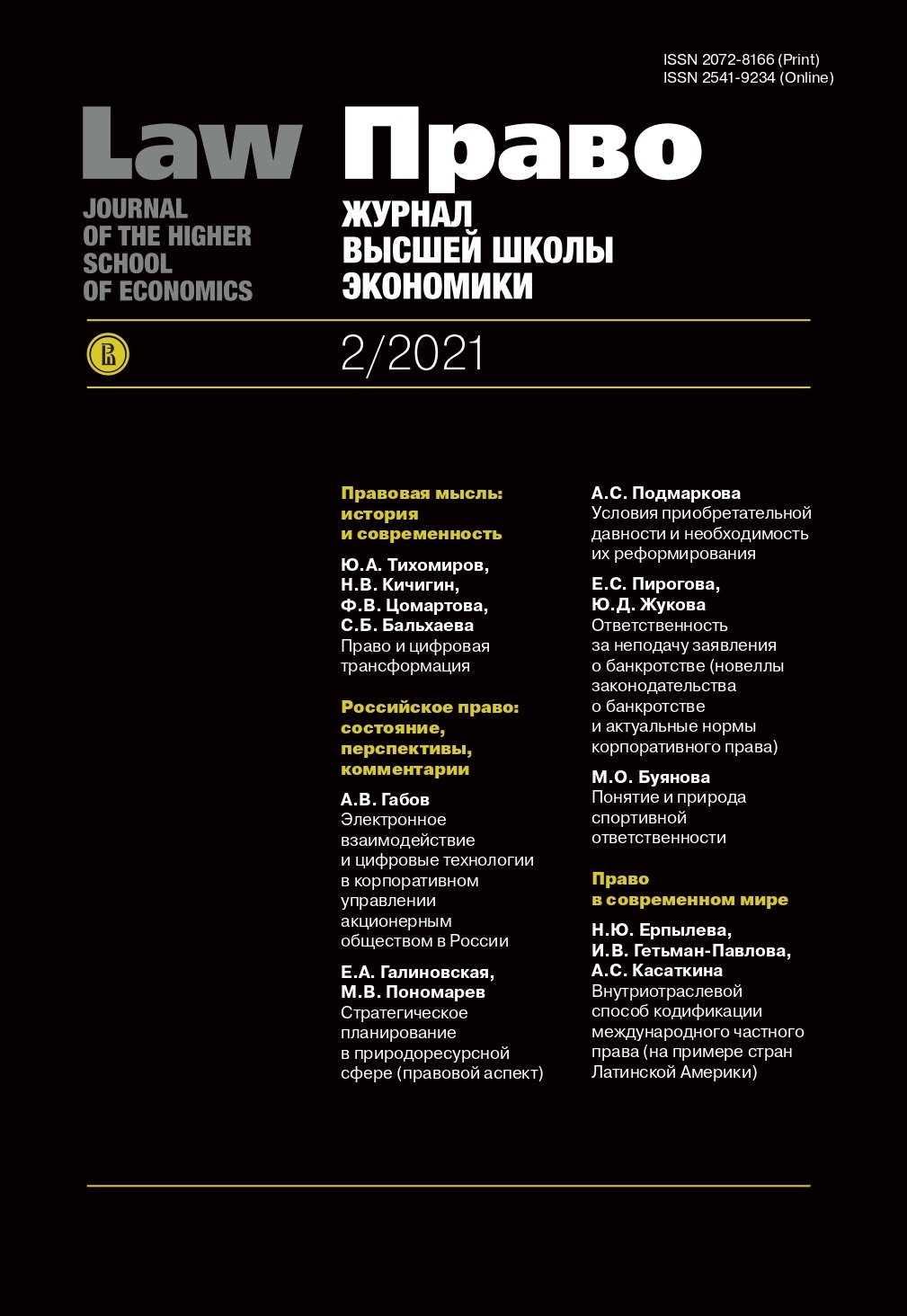Право и цифровая трансформация
Аннотация
Сосуществование феноменов цифровизации и права обусловливает их взаимовлияние и актуализирует задачу исследования проявляющегося по отношению друг к другу воздействия и изменений, которое оно вызывает. Технизация общества способствовала его дальнейшему развитию, ее цели и направления во многом определялись публичными и иными социальными институтами, включая право. В современный период цифровизация находится в том же русле сочетания социальных и технических механизмов управления общественными процессами, причем в широком социально-экономическом контексте и в связи с реализацией стратегических национальных целей нашей страны. Очевидно заметное влияние аналогичных явлений и процессов и в зарубежных странах. Эти обстоятельства предопределяют вызовы праву. В статье сделана попытка рассмотреть правовые проблемы цифровизации с точки зрения комплексного, межотраслевого и системного анализа, который позволил преодолеть чрезмерную специализацию отраслевых юридических наук, иметь в виду динамику соотношения национального и международного права, а также учитывать контекст достижений других общественных наук. Новейшие цифровые технологии наполняют функциональное воздействие права новым содержанием, что, во-первых, находит отражение в динамично развивающемся отраслевом законодательстве, а во-вторых, в концентрированном виде проявляется в формировании нормативных правовых актов общего характера, создающих базу цифровизации. Цифровизация преобразует характер деятельности субъектов права и объемы их правоотношений, порождает новые формы принятия управленческих решений и ответственности за их неисполнение, проблематизирует тематику юридической природы технического (электронного) правового акта и его места в системе правовой регуляции, ставит вопрос о возможностях и пределах автоматизации права. Авторы приходят к выводу, что в условиях цифровой трансформации экономики, социальной сферы и государственного управления право сохраняет устойчивую роль регулятора социально-экономических и иных общественных процессов, обеспечивая как стабильность, так и необходимую преобразовательную деятельность индивидуумов и публичных институтов.
Литература
Artyukhin R.E., Povetkina N.A. (eds.) (2021) New institutions of budgetary law and digital revolution. Moscow: Norma INFRA-M, 192 p. (in Russian)
Bogolyubov S. A. (2020) The development of environmental law in Eurasia: A monograph. Moscow: INFRA-M, 432 p. (In Russian)
Düwell M., Rehmann-Sutter Chr., Mieth D. (2008) The Contingent Nature of Life: Bioethics and Limits of Human Existence. Heidelberg: Springer, 373 p.
Engels F. (2019) Anti-Dühring. Moscow: AST, 480 p. (in Russian)
Haraway D. (2017) A Cyborg Manifesto. Moscow: Ad Marginem Press, 128 p. (in Russian)
Hochberg L., Cochrane T. (2013) Implanted Neural Interfaces. Ethics in Treatment and Research. Neuroethics in Practice. Medicine, Mind, and Society, ed. by Chatterjee A., Farah M. Oxford University Press, 290 p.
Khabrieva T.Y. (2016) La réforme constitutionnelle dans le monde contemporain. Moscow: Nauka, 223 p.
Lebedev V.M., Khabrieva T.Y. (ed.) (2019) Justice in the Modern World: monograph. Moscow: The Institute of Legislation and Comparative Law under the Government of the Russian Federation, 688 p.
Pilipenko A.N. (ed.) (2021) Trends in digitalizing executive power in foreign countries. Moscow: 232 p. (in Russian)
Rayfuse R. (2017) Public International Law and the Regulation of Emerging Technologies. The Oxford Handbook of Law, Regulation, and Technology. Brownsword R., Scotford E., Yeung K. (eds.) Oxford University Press, pp. 500-522.
Schwab K. (2016) The fourth industrial revolution. Moscow: Eksmo, 40 p. (in Russian)
Sinitsin S.A. (2020) Russian and foreign civil law in the conditions of robotics and digitalization. A case of interdisciplinary research. Moscow: Infotropik, 212 p. (in Russian)
Stepanenko D. (2016) With a wave of thought. Populyarnaya mekhanika, no 2, pp. 26-27. (in Russian)
Talapina E.V., Yuzhakov V.N., Dvinskikh D.Yu., Efremov A.A., Cheresghneva I.A. (2020) Data circulation in state management: perspectives of legal regulation. Moscow: Delo, 244 p. (in Russian)
Tadeusiewicz R., Rotter P., Gasson M. (2012) Restoring Function: Application Exemplars of Medical ICT Implants. Human ICT Implants: Technical, Legal and Ethical Considerations. Hague: Springer, 186 p.
Yudin B.G. (2011) Borders of human existence in the world of new technology. Rabochie tetradi po bioetike Tischenko P.D. (ed.). Moskovskiy gumanitarniy universitet, pp. 4-22 (in Russian)
Copyright (c) 2021 Право. Журнал Высшей школы экономики

Это произведение доступно по лицензии Creative Commons «Attribution-ShareAlike» («Атрибуция — На тех же условиях») 4.0 Всемирная.


















